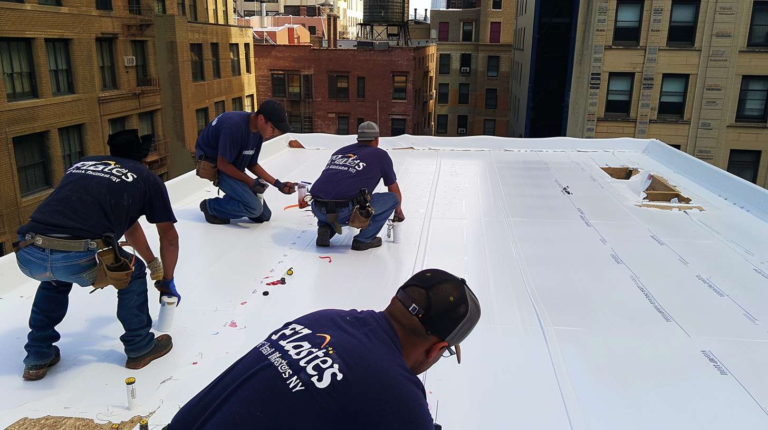Professional Flat Roof Coping Stones Installation & Repair
After twenty-three years installing and repairing flat roof coping stones across Queens, I can tell you that these crucial roof edge components are both the unsung heroes and the most common failure points on commercial buildings. Last month alone, we handled seven emergency calls where failed coping stones had allowed water infiltration that caused thousands in interior damage.
A flat roof with coping stones isn't just about aesthetics - though they certainly clean up the roofline. These precast concrete or natural stone caps serve as the primary defense against water penetration at the roof's most vulnerable points: the perimeter walls. Here's what I've learned from installing over 40,000 linear feet of coping stones on everything from two-story walk-ups in Astoria to six-story commercial buildings in Long Island City.
What Are Flat Roof Coping Stones and Why Your Building Needs Them
Coping stones are the protective caps installed along the top of parapet walls on flat roofs. Think of them as the roof's first line of defense against Queens' notorious weather - from the brutal nor'easters that roll off the East River to those summer thunderstorms that dump three inches in an hour.
The science is straightforward: water always finds a way in. Without proper coping stones flat roof protection, rainwater seeps into the porous masonry of parapet walls, freezes during winter, expands, and creates cracks that only get worse with each freeze-thaw cycle. I've seen buildings where the owners ignored failing coping stones for just two winters - the repair bills were staggering.
Modern coping stones do more than just shed water. They're engineered with drip edges that direct moisture away from the building face, and when properly installed with sealed joints, they create a continuous barrier against moisture infiltration. The key word there is "properly" - and that's where most problems start.
Common Coping Stone Problems We See in Queens Buildings
Look, I don't care what other contractors tell you about coping stone longevity - in Queens' climate, even the best installations face challenges. The salt air from Flushing Bay, the temperature swings from 15°F winters to 95°F summers, and the constant moisture exposure mean these systems work hard for their money.
The most frequent issue? Joint failure. Those mortar joints between individual stones aren't just decorative - they're structural seals. When they crack or crumble (usually after 8-12 years depending on installation quality), water penetrates and starts the deterioration cycle. We replace failed joint sealant on probably sixty percent of our service calls.
Stone cracking comes next, especially with natural limestone or sandstone coping. These materials look beautiful when new, but Queens weather is unforgiving. Freeze-thaw cycles cause hairline cracks that gradually widen. Last Tuesday we removed a twelve-foot section of limestone coping on Northern Boulevard where the stones had cracked completely through - water had been entering the building for months before the owner noticed interior staining.
Poor drainage design causes problems too. Flat roof coping stones need proper slope and overhang to function correctly. I can't tell you how many times we've been called to buildings where the original installer didn't provide adequate overhang or failed to slope the stones properly. Water pools instead of draining, accelerating deterioration and creating ice dams in winter.
Professional Coping Stone Installation Process
At Flat Masters NY, we approach every coping stone installation with the understanding that this work needs to last at least fifteen years in Queens' challenging environment. Our process starts with a thorough assessment of the existing parapet wall condition - you can't install lasting coping stones over compromised masonry.
The substrate preparation is critical. We repair any damaged masonry, ensure proper wall height and levelness, and apply a high-quality primer system before stone installation. This step alone often determines whether the installation succeeds or fails within five years.
Stone selection matters more than most property owners realize. Precast concrete coping offers excellent durability and consistent dimensions, making installation more predictable. Natural stone provides superior aesthetics but requires more careful selection - we source our limestone exclusively from domestic quarries with proven freeze-thaw resistance ratings above 500 cycles.
The actual installation involves securing each stone with both mechanical fasteners and a continuous bed of modified mortar. We use stainless steel anchors rated for coastal environments (remember, Queens gets salt spray even miles inland) and ensure each stone has minimum 2-inch overhang with proper drip edge profiling.
Repair Solutions for Failing Coping Stones
Not every coping stone problem requires complete replacement - though property owners often assume it does after getting quotes from inexperienced contractors. Joint resealing represents about forty percent of our coping stone work, and when done correctly, extends system life by 5-8 years.
We use polyurethane sealants specifically formulated for stone applications, not the generic stuff you find at home improvement stores. The preparation work - cutting out old sealant, cleaning joint faces, applying primer - takes longer than the actual sealing, but it's what makes the repair last.
Individual stone replacement is often the most cost-effective solution when damage affects only a few stones. The trick is matching the existing stone profile and color - something that requires maintaining relationships with multiple suppliers and keeping sample inventories of common stone types we've installed over the years.
Sometimes we encounter situations where the underlying parapet wall has deteriorated to the point where coping stone repair isn't sufficient. These cases require rebuilding the top course of masonry before installing new stones. It's expensive, but it's the only way to create a lasting solution.
Maintenance Requirements for Long-Term Performance
So what's really the best maintenance schedule for flat roof coping stones? Based on our experience with hundreds of Queens buildings, annual inspections prevent most major problems. We recommend detailed inspections each fall before winter weather arrives, focusing on joint condition, stone integrity, and drainage performance.
The maintenance work itself is straightforward: cleaning debris from drainage channels, resealing minor joint cracks before they expand, and replacing individual damaged stones before adjacent stones are affected. Property owners who follow this schedule typically get 18-22 years from their coping stone installations versus 10-14 years for those who ignore maintenance.
Here's something most contractors won't tell you: the building's heating system affects coping stone longevity. Buildings with poor roof insulation experience more frequent freeze-thaw cycles at the roof edge, accelerating coping stone deterioration. We always recommend evaluating roof insulation during coping stone replacement projects.
Cost Factors and Investment Considerations
Coping stone costs vary dramatically based on material selection, building height, access requirements, and existing condition of parapet walls. Precast concrete installations typically run $45-75 per linear foot for straightforward projects, while natural stone can reach $120-180 per linear foot depending on stone type and complexity.
But here's the thing about coping stone costs - the installation represents maybe sixty percent of total project expense. Staging and access equipment, masonry repairs, disposal of existing materials, and weatherproofing add significantly to project totals. A building owner recently asked why our estimate included $8,000 for staging on a 200-linear-foot job - until they realized their building was six stories with no roof access for equipment.
The payback calculation is compelling when you consider water damage prevention. We've documented cases where $15,000 invested in comprehensive coping stone replacement prevented over $75,000 in interior restoration costs. Insurance companies increasingly recognize this, sometimes offering premium reductions for buildings with recently updated coping stone systems.
Choosing the Right Contractor for Coping Stone Work
Not all roofing contractors understand coping stone installation - it's specialized work that combines roofing knowledge with masonry skills. Ask potential contractors about their experience with your specific building type and stone material. Request references from similar projects completed within the last three years.
Licensing and insurance are non-negotiable. In New York, this work requires both roofing and masonry licenses, plus comprehensive liability coverage. We carry $2 million in general liability specifically because coping stone work involves significant water damage risk if done incorrectly.
The estimate process tells you a lot about contractor competence. Detailed proposals specify stone type, fastener specifications, sealant products, and warranty terms. Vague estimates that just quote "per linear foot" prices without material specifications usually indicate contractors who don't understand the complexity involved.
Why Flat Masters NY for Your Coping Stone Project
We've been solving flat roof coping stones problems in Queens since 2001, working on everything from pre-war apartment buildings in Elmhurst to modern commercial developments in Hunters Point. Our team includes certified masons and licensed roofers who understand both the structural and waterproofing aspects of these installations.
What sets us apart? We maintain an inventory of common stone profiles and colors, meaning faster project completion for standard repairs. Our relationships with local suppliers like Beacon Building Products on Northern Boulevard ensure reliable material sourcing even for custom applications.
Every installation includes a comprehensive warranty covering both materials and workmanship, plus detailed maintenance recommendations specific to your building and stone type. We also provide annual inspection services for clients who want professional oversight of their investment.
Need expert assessment of your building's coping stone condition? Call Flat Masters NY at (917) 994-7618 for a comprehensive evaluation. We'll provide honest recommendations based on actual conditions, not sales quotas.


